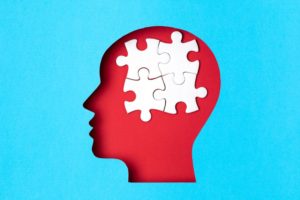If you are suffering from anxiety, you know that it can be overwhelming. Performing everyday tasks feels difficult and often holds you back from enjoying your life to the fullest.
Anxiety disorder is unique to an individual, and how anxiety appears in each person can vary. Symptoms can range from more mild, such as feeling a lack of confidence, to more severe reactions such as panic attacks or not being able to leave your home.
Over 6 million people suffer with anxiety each year, yet only 43% actually seek treatment.
The good news is, change is possible.
Hypnotherapy for anxiety can help you gain back control over your thoughts and feelings. Hypnosis is designed to teach you clear, effective techniques to overcome anxiety, helping you live a full, happy life.
In this article we’ll discuss how effective hypnotherapy is for anxiety, when you should seek help, and other important details you should know before booking your first hypnotherapy session for anxiety disorder.
What is Anxiety?
Anxiety is often described as feeling uneasy. This can manifest as an intense feeling of worry or fear, ranging from mild to severe.
It is very common and perfectly normal to feel anxiety at some points in our life, such as just before a job interview or going to the doctors. Sometimes it can be difficult to tell if we have anxiety, or are just feeling worried about a certain life event.
People with anxiety often feel this sense of fear or worry for a long period of time, which can be persistent and hard to control. These feelings can become so intense that they begin to impact our quality of life.
When struggling with anxiety, it can feel as though once you have resolved one anxious thought, another appears about a different issue. It’s common for anxiety to ‘snowball’ and can become difficult to manage.
Anxiety can also appear in our lives physically, such as experiencing chest pain or panic attacks.
What Causes Anxiety?
There is no ‘one size fits all’ for anxiety, and the cause or triggers will vary from person to person.
There are usually a number of factors as to why someone may suffer with anxiety, such as PTSD (post traumatic stress disorder) or a traumatic event such as a life altering illness or death.
However, genetics and environmental reasons can also play a part in why someone suffers with anxiety, along with other factors.
Below are a few of the most common causes for anxiety:
Difficult Childhood Or Adolescence
Experiencing difficult situations in your childhood can manifest itself as anxiety in your adult life. Struggling with stress or trauma at a young age, while our brains are still developing, can be especially impactful. This may follow us through to adulthood, developing into an anxiety disorder, according to medical studies.
Losing Someone Close To You
Anxiety can be an unexpected, but common, part of grieving. It isn’t unusual to worry about what might happen to yourself or others when losing someone close to you, especially if the death was sudden.
The period before someone’s passing can also be particularly stressful. This can lead to feeling a heightened sense of anxiety, even after they pass.
It is common to feel anxious when grieving, but if your anxiety persists for longer than 6 months, you could be suffering from an anxiety disorder or complicated grief.
Environmental Reasons
A 2018 review noted how environmental factors can play a part in experiencing anxiety. This can include an individual’s upbringing within a cultural or religious setting, family composition, or fears around their identity or sexuality.
Genetics
According to Web MD, you have a higher chance of inheriting anxiety if you have a close family member who suffers, such as a parent or sibling.
There is less scientific backing around the link between genetics and anxiety. Often, a combination of genes from your parents can influence whether you’re likely to experience anxiety. But doctors are unable to prove which exact groups of genes determine this.
While genetics can play a part in our mental health, it’s worth noting that most conditions aren’t driven solely by genetics. There is usually a combination of factors that can bring on anxiety, such as environment, lifestyle, or life events. These experiences, mixed with genetics, can increase the chance of developing an anxiety disorder.
Low Self Esteem and Social Anxiety
Having low self esteem can cause an individual to develop anxiety. It’s not uncommon for low self esteem to be damaging to our mental health, and can also cause us to turn to other habits, such as smoking and drinking, as a way to cope with the condition.
Low self esteem can also result in social anxiety disorder (SAD). There can often be a direct correlation between low self esteem and social anxiety, with those suffering more likely to worry about facing failure in front of others, says a 2020 study.
When To Seek Help For Anxiety
As we’ve discussed in this article, feeling worried from time to time is perfectly normal.
However, if you find your anxiety is affecting your quality of life, such as performing simple tasks, then you may need to reach out for support.
Signs that you may benefit from anxiety help include:
- Avoiding situations or certain environments as a way to deal with anxiety, such as school or your office.
- Anxiety is beginning to affect your relationships or work.
- Your anxiety feels out of control or all consuming.
- You’re having trouble concentrating, sleeping or performing simple tasks.
- You’re experiencing suicidal thoughts. If you’re going through this currently, please seek immediate help.
If you are suffering with anxiety, there is help available. In recent years, it has been proven that hypnotherapy can be an effective way to treat anxiety disorders.
How Can Hypnotherapy Treat Anxiety?
Hypnotherapy for anxiety can be an extremely effective treatment, helping you manage your thoughts, symptoms and anxiety triggers. This is achieved through a variety of techniques, such as guided meditation, visualisation and affirmations.
Hypnotherapy accesses the unconscious mind, which is often where the root of our anxiety often lies. With 90% of our brain being made up of the subconscious mind, hypnosis can aid in targeting the underlying issues behind your anxiety.
The techniques used in hypnotherapy are designed to create new pathways in the brain. Over time, repeated use of these techniques can replace old thinking patterns, often caused by certain triggers or past experiences.
A 2016 study echoed the effectiveness of hypnotherapy for anxiety. Researchers within the study found that participants who took part in guided hypnosis sessions had much greater emotional and physical control, focused attention and increased confidence.
What Are The Benefits of Hypnotherapy for Anxiety?
Hypnotherapy techniques allow us to be in a heightened state of awareness, sometimes referred to as a trance.
In this state, our brain will be more susceptible to suggestions, temporarily blocking out other thoughts that can cloud our mind from day to day.
With the help of a qualified hypnotherapist, our subconscious mind will take on and begin to recognise these suggestions as a fact.
A study showed that over time, these suggestions can help improve the connection between the mind and body, easing symptoms of anxiety.
Will I Actually Be Hypnotised During Hypnotherapy?
Unlike what you may have seen in movies, hypnotherapy doesn’t actually ‘hypnotise’ you. You will be totally aware the whole session, gradually being eased into a more relaxed state.
This will help make your mind more receptive, which is what makes hypnotherapy for anxiety so effective.
How Many Hypnotherapy Sessions Are Needed For Anxiety?
How many sessions you need to treat your anxiety can vary from person to person. In some cases, clients have only needed 2-3 sessions to see the effects of hypnotherapy.
However, on average, clients will typically need a minimum of 8-10 sessions. This should allow enough time to understand your anxiety triggers and symptoms, working to create new, healthy ways to manage your anxiety going forward.
Can Hypnotherapy Make Anxiety Worse?
Prior to starting hypnotherapy, people sometimes worry that hypnotherapy can make anxiety worse. This fear often stems from the fear of being ‘out of control’ during hypnosis.
If you are taking part in hypnotherapy from a qualified hypnotherapist, then hypnotherapy is very unlikely to heighten your anxiety.
A trained hypnotherapist should never use techniques that make you uncomfortable or feel unsafe.
If you’d like to read more about what’s involved in a hypnotherapy session for anxiety, head over to our hypnosis for anxiety page.
Do You Need Help Managing Your Anxiety?
If you’ve never had hypnotherapy previously, or even any therapy at all, finding the right choice for you can feel overwhelming.
I offer a free, no-obligation consultation call for those who are thinking about treating their anxiety with hypnotherapy, but want to know more before committing to sessions.
Simply visit our appointment page and we can book in a time that works for you.
Based in Epsom, we offer face-to-face sessions to talk through your issues.
Alternatively, for those further afield, we offer virtual sessions over Zoom, which can be a great choice if you want to experience hypnotherapy in the comfort of your own home.
You can get in touch via the contact button below, or call me directly on 07956899472.

Ayesha Somji is a qualified FreeMind Hypnotherapist with over 6 years of experience in hypnotherapy, specalising in treating depression and anxiety.
She is passionate about helping others live their life to the fullest, using her knowledge and expertise in hypnotherapy to help people gain control of their thoughts and their life.
Alongside being a qualified hypnotherapist, Ayesha is also a licensed Reiki Teacher and has a Psychology Diploma from the Centre of Excellence.
Outside of hypnotherapy and reiki, Ayesha loves spending time with her children, meditating and swimming.






